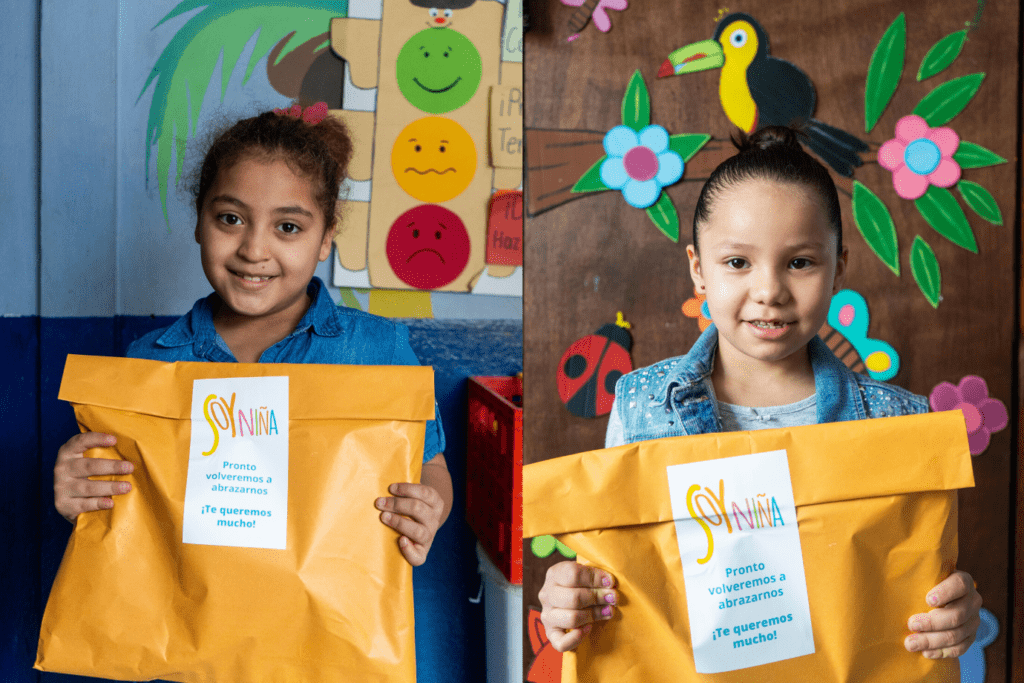Soy Niña is a non-profit organisation in San José, Costa Rica, that empowers at-risk girls so they can prevent unwanted pregnancy and break the cycle of poverty. It’s the only girl-serving organisation in the country and since March, it’s been working in overdrive to maintain close relationships with girls in lockdown.
For months now, girls in Costa Rica have been unable to attend school due to COVID-19. And devastatingly, for some in San José, they’ve been unable to attend “Club Niña”, a weekly space run by Soy Niña, dedicated to expression, openness, love and trust.
In June, Soy Niña distributed the first round of emotional support kits to more than 120 girls in the Desamparados county, a gesture to ensure girls enrolled in their program are not left behind.
The kits include a 25-page magazine “Planeta Soy Niña”, especially designed as emotional support for the girls. It provides basic information about COVID-19, told from the perspective of Luna, a fictional 10-year-old girl. There’s also colouring pencils and paper, menstrual pads for the older girls and support guides for the whole family.

“I truly believe everyone needed a Soy Niña as a young girl,” co-founder and director of Soy Niña, Ana Laura Araya, tells Women’s Agenda.
“We were all insecure. We all felt uncomfortable during puberty. Many of us never got taught how to identify when our human rights were being violated.”
Below, Ana Laura Araya tells Women’s Agenda about why she decided to launch Soy Niña and the impacts of the pandemic on girls in Costa Rica.
Can you tell us a little about you and your background, your age and the type of work you usually do? How you got passionate about this area of work?
My name is Ana Laura Araya. I am 35 years old. I used to live in Atlanta, GA but moved back to my home country, seven years ago. I had worked with teen pregnancy prevention in Atlanta and when I came back to Costa Rica I realized there was very little being implemented in the country to prevent teen pregnancies. And they are very common here in Costa Rica, as they are in the rest of the Latin American region. In fact, we are the only region in the world where teen pregnancies in girls under 15 are increasing.
I am extremely passionate about gender equality, especially when it has to do with girls under 18. They usually face double discrimination: first for being a women and then for being underage. I had once met three 11-year-old girls about to give birth in Guatemala. I knew I had to do something about it.
So in 2018, after years of planning, I started Soy Niña with my friend Adriana. We decided to get inspired on a program in Atlanta that is over 30 years old and has proven to prevent teen pregnancies and empower girls.
What have you seen as the impacts of the pandemic in Costa Rica, including on girls?
There has not been official data stating that teen pregnancies have risen or that domestic violence has increased yet, at least in Costa Rica. Unfortunately, we are just waiting for data to come out and prove our biggest fears. We know that girls will be the victims this pandemic. We know teen pregnancies will rise, we know there will nbc more sexual violence, more child marriages and more school expulsion. We expect that many girls won’t go back to school after the pandemic ends. Right now, what one big challenge the lack of technology and access to the internet. Costa Rica is a developing country, yet half the all students in the entire country do not have access to the internet, or a computer. This makes it extremely difficult to be able to continue their formal education.
Girls are re-living anxiety, having sleep problems. They are in their homes all day long, with many family members, very little privacy, they can’t go outside to play.

Why did you start the not for profit, what key challenge are you looking to solve?
I started Soy Niña because there was not a single girl-serving organization the country. At first, Soy Niña was going to be a small program inside of another nonprofit, but I saw so much potential. I knew it had to start as its own cause. And I have always thought big.
I have dreams that Soy Niña can reach girls in other countries, like our neighbor country, Nicaragua. So many people have identified with the cause because I truly believe everyone needed a Soy Niña as a young girl. We were all insecure. We all felt uncomfortable during puberty. Many of us never got taught how to identify when our human rights were being violated. The girls that we work with need us more than anything.
Our program has provided a safe space, a learning space, a listening space, an all-girls space, its been incredible and we have seen the positive change that our program has had in the girls. All girls that we work with live in very vulnerable communities where drug trafficking is a part of their every day life.
What’s in the kits, how many have you been able to distribute?
The kits include a magazine especially designed as emotional support, materials such as paper and coloring pencils and menstrual pads for the 4th to 6th girls. So far, only the girls in our program (120 girls) have received the kits. However, in the next few weeks, we will be working to be able to distribute these kits in other parts of Costa Rica.
You can find out more about Soy Niña and donate to their emergency fund for girls here.


